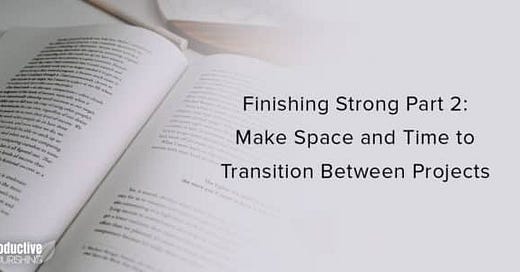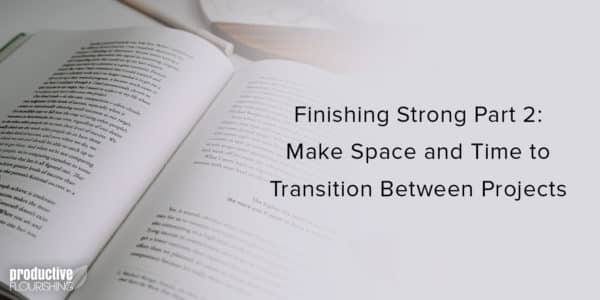Finishing Strong Part 2: Make Space and Time to Transition Between Projects
Sliding into the next project doesn't help you acknowledge your milestone AND starts you off depleted for the next project
Today’s post in the Finishing Strong series encourages us to take a pause... and be sure to check out part 1 of the series to get the full scoop.
[The following is an excerpt from my book, Start Finishing.]
There’s a natural tendency to want to start the next project right after finishing a major project, or at least plan that that’s what you’re going to do. Doing that, though, is akin to finishing a marathon only to immediately start running another. We’d understand the wear, tear, and likelihood of injury for the marathon runner, and, as you might guess, there are analogous conditions awaiting those who don’t allow for recovery and transition time with their work.
There’s also a corollary that follows the insight that the more it matters to you, the more you’ll thrash: the more it matters to you, the greater the need for downtime and transition time after finishing your project.
There’s a lot of your heart, blood, soul, and time tied up in the project, and finishing the project releases all that energy into the world. But, importantly, that energy is released from you, meaning there’s an energetic void in you where the project once lived. Living with that void can be unsettling, disorienting, uplifting, relieving, and anticlimactic all at the same time.
Pushing a project through the red zone also often requires a lot of discipline, boundaries, and courage, so there’s residue all around you. Chores and administrivia may have piled up. Loved ones and friends may have directly supported your project or have dealt with being disconnected from you while you were plugged into the project.
There may be a backlog of small projects that have accrued as you triaged your best-work project. And you may be flat-out spent after leaving it all on the field with your project — it’s not at all uncommon for people to get sick right after a big finish, as if their body was holding everything together just long enough to finish.
You may be dealing with all the elements above, or it may only be one that’s particularly weighty for you. In any event, it’s better to plan that you’ll need downtime and transition time and actually allow yourself to take it rather than assume that you’ll be on point immediately following the completion of your project.
Here are some questions to help give some defaults for your transition time:
What low-energy projects or tasks would either feel good to work through or relieve unnecessary pressure?
Who are the people you would either like to catch up with or who would make you feel less pressure to catch up with?
Do you have outlets, hobbies, or other activities that you would like to catch up on? For example, if you’ve been on a writing project but like gardening, catching up on your gardening would create some space without your sitting around twitching and looking for something to do.
If nothing else, you’ll have some cleanup work to do after you cross the finish line. We’ll discuss what that looks like in the next post in the series.





